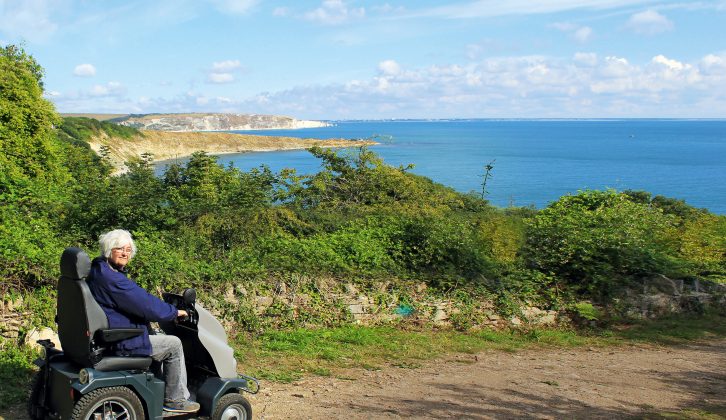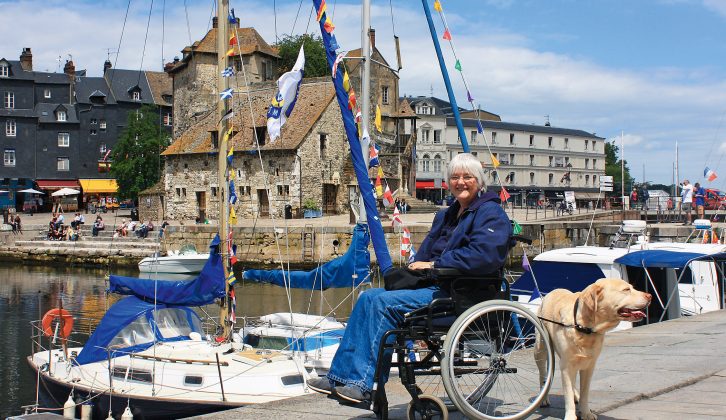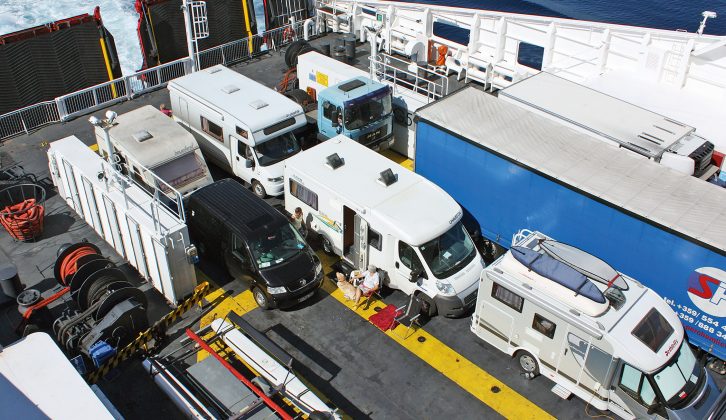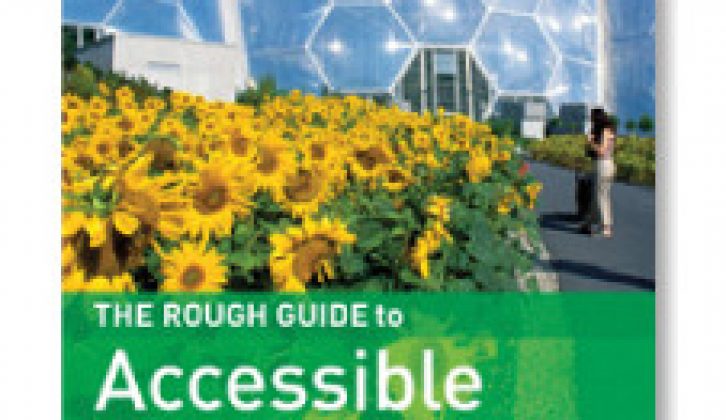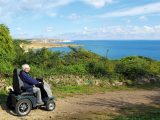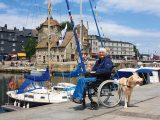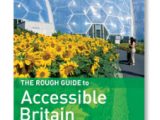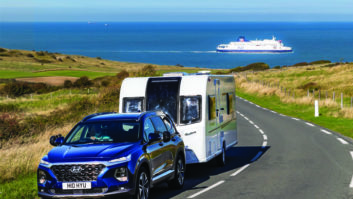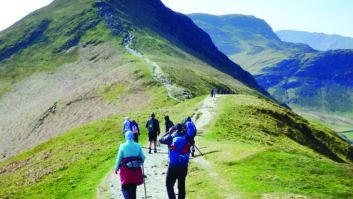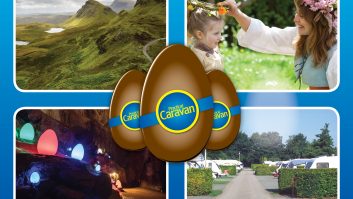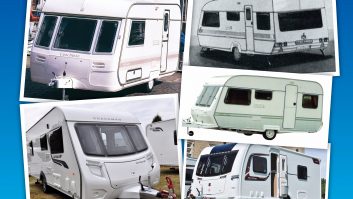Planning a holiday is relatively easy for most people: simply choose your tourist destination and the time you want to travel, and that’s more or less it. But what if you have a disability and are a wheelchair-user – what more do you have to consider to find accessible holidays? Surprisingly, if you tour in a caravan or motorhome, it won’t be that much: there’s no need to worry whether hotel-room doors are wide enough for your wheelchair, if there are steps up to reception or whether a lift is working! However, you will need to make the right choice of tourer.
Wheelchair-friendly caravan layout
Our caravan has a fairly low entrance, and we also carry a wide aerobic step that splits the distance between the ground and the entrance. Inside, the layout is relatively open and the fixed bed is low enough for me to sit on and use the dressing-table mirror.
I’ve found that a fixed bed is a must in our caravan: if I am having a bad day or am suffering from fatigue I can easily have a few hours’ rest. Our caravan washroom is spacious and allows me to use a folding stool, so that I can sit and shower in comfort.
Wheelchair storage in the caravan is also a consideration. A folding wheelchair tends to fit easily under a fixed double bed, provided there is an exterior hatch; alternatively, it can be carried on a cycle rack. Bike racks are becoming increasingly popular on UK caravans, and now The Swift Group is fitting Thule rack mounts to its models.
There are also firms that specialise in adapting vehicles for disabled users. So if you’d like to buy an adapted caravan, try these caravan converters: Coachbuilt GB in Atherstone, Warwickshire (Tel 024 7634 1196), and Nirvana Mobility near Canterbury in Kent and Worthing in West Sussex (Tel 01903 205 065). Both can adapt your caravan to suit your exact needs.
How we plan accessible holidays
When choosing tourist destinations and campsites for accessible caravan holidays, the amount of planning we do depends on whether we are touring at home or abroad. In the UK we look for campsites in towns, or on the edge of them; unfortunately for us, these seem to be relatively scarce.
We like to be able to walk (or in my case be pushed) from the caravan site into the village or town, using safe pedestrian routes or Tarmac paths. A nice pub or restaurant may only be half a mile away, but if it requires a trip on a narrow path through woodland, then it’s far from ideal! Many UK campsites are rural, located far from civilisation, so it’s hard to leave the car on-site. There may be a local bus stop, but it isn’t easy to hop on a bus when you’re in a wheelchair.
Hardstanding pitches are best
We choose campsites with hardstanding pitches, and preferably Tarmac access roads. Pushing a wheelchair across gravel or grass isn’t easy, and walking across it when your feet don’t work is very challenging.
For us, the site’s dedicated disabled facilities aren’t all that important – I often find that they seem to have been designed by able-bodied people, without too much thought about what is required. Have you ever tried to open a door towards you on an uphill slope while sitting in a wheelchair? Fixed showerheads are also a disaster, because you can’t get the temperature correct before you’re immersed in water. For those reasons, I generally use the facilities in our own caravan.
We tend not to book specific disabled pitches at British sites, because these are often situated near the toilets – not the most scenic of places to sit next to!
Countryside Mobility
When considering places to visit, we usually look for disability-friendly activities, such as the off-road ‘Tramper’ scheme operated by Countryside Mobility. The scheme allows me to enjoy the countryside and go out walking with my husband, Peter.
We also joined the National Trust; this not only gives us free parking at its many sites, but also means that, for the cost of my membership, we can both look around the houses and gardens by using the additional, free, carer’s card.
We recommend buying the Rough Guide to Accessible Britain, which gives details of more than 200 accessible tourist attractions and any discounts they offer.
Helpful tourist information office staff can usually suggest accessible places of interest in or around local towns and villages. On the whole, disabled access to tourist attractions is improving in Britain.
Use Eurotunnel to visit France
When travelling to France and beyond, we usually cross to Calais via the Eurotunnel, because it is so much easier for me than the ferry: I can stay in the car, and the journey only takes 35 minutes. Eurotunnel staff always load wheelchair-users’ vehicles first or last, and we are generally in a compartment on our own.
When taking Continental ferries, such as those from Italy to Greece, we always use the ‘Camping on Board’ option. This allows us to stay in our caravan during the crossing, with electric hook-up provided. You have to turn your caravan’s gas bottle off on the ferry, so you can’t use the gas cooker during the crossing. Just take a freestanding electric cooker, such as a Remoska, and you’ll be self-sufficient.
We tend to make our own drinks on the ferry, but Peter goes to the restaurant and brings back meals for us to eat. The Camping on Board scheme also makes it easier if you are travelling with pets: you won’t need to leave them alone.
Stay at aires abroad
Apart from booking our Eurotunnel crossing, we do very little planning for our Continental tours, preferring to go where the mood takes us. We use a mixture of ACSI sites and (where caravans are permitted) sostas and aires, and rarely stay anywhere more than a couple of days, because the journey itself is a big part of our enjoyment of a holiday.
Most aires are located in or on the edge of towns, and are generally hardstanding. Some of the newer aires have allocated disabled pitches, which are larger and sometimes free for Blue Badge holders. Surprisingly, disabled pitches are usually vacant, but be aware that many aires only welcome motorhomes, particularly in France – and some security concerns have been reported.
Accessible holidays await!
Being disabled and in a wheelchair doesn’t stop you from travelling where you want. Provided you have a willing partner and an equally willing attitude to life, the world is waiting to be discovered.
Accessible UK campsites
- Tewkesbury Caravan Club Site
- Whitewater Caravan Club Site, Stockton
- Baltic Wharf Caravan Club Site, Bristol
- Silver Road Caravan Park, Burnham-on-Crouch
- Riverside Caravan Park, Worksop
- Durham Amateur Rowing Club CL
- Rawcliffe Manor, York
- Willow Lane CS, Beverley
Accessible campsites in Continental Europe
- Camping de l’ÎIe d’Offard, Saumur, France
- Camping Les Deux Rivières, Millau, France
- Parking Lagani, Giardini Naxos, Sicily
I’ve found that a fixed bed is a must in our caravan: if I am having a bad day or am suffering from fatigue I can easily have a few hours’ rest
